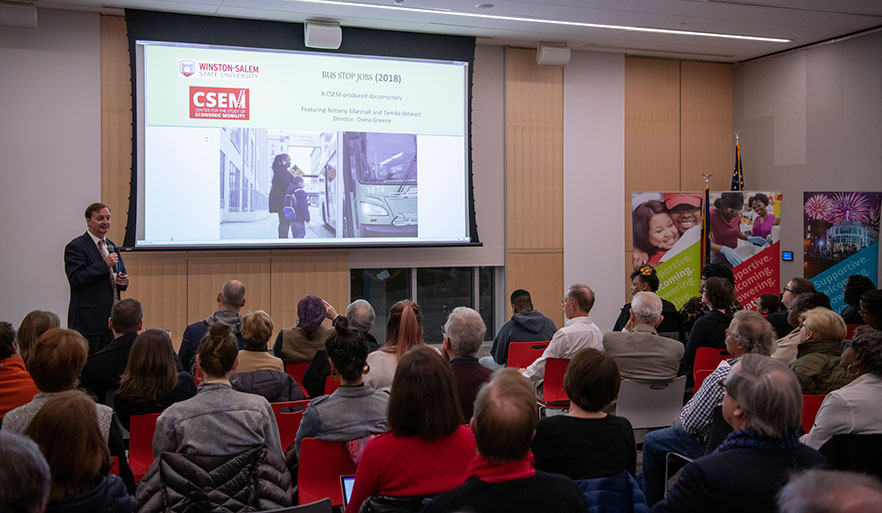New CSEM report provides glimpse of struggles facing Winston-Salem bus riders

A new report from Winston-Salem State University’s (WSSU) Center for the Study of Economic Mobility (CSEM) is providing a glimpse into the struggles facing employed Winston-Salem residents who rely on public transportation.
Dr. Craig Richardson, founding director of the CSEM and an economics professor at WSSU, said the survey is the first to document the opportunity costs of long bus commutes for employed Winston-Salem Transit Authority (WSTA) bus riders.
“Our public bus system remains a valuable asset for residents of the city, but challenges of moving people across low density suburban areas calls for us to think about innovative solutions that potentially link or complement the existing fixed bus routes,” said Richardson, who led the survey. “We think private business, nonprofits and government can potentially work together to lower commute times for those unable to afford a vehicle. Time is the most valuable commodity, especially for those at the bottom of the economic ladder.”
The survey of 215 employed Winston-Salem Transit Authority bus riders, conducted by Winston-Salem State University’s Center for the Study of Economic Mobility, finds that:
- The average hourly wage of employed bus riders using WSTA is $10.14.
- The average employed bus rider has used the bus system for 11.2 years.
- Employed bus riders spend 8.7 hours more a week in commuting time than equivalent workers taking vehicles. That averages to lost wages of $4,350 per year.
- Nearly half (49 percent) of surveyed bus riders have turned down higher paying jobs, averaging $12.37, because those jobs did not fall on the bus routes. That’s like turning down a 20 percent pay raise for these individuals.
- 13 percent had turned down a promotion at a current job because of the current bus schedule, but those people would have been paid an average of $2.81 more an hour, or an increased salary of $3,612 a year.
- The diets of employed bus riders are affected. They report eating less fruits, vegetables and healthy meats.
- Bus riders also report access to medical care is more difficult: 48 minutes each way by bus to their nearest medical provider versus 15 minutes if they took a vehicle. With these individuals already facing nearly 9 hours more in commute times, this squeezes out time spent in furthering education, family time, exercise and leisure.
The results were presented at “What Bus Riders Tell Us About Their Lives, Choices and Missed Opportunities,” an event sponsored by CSEM and held at the Forsyth County Central Library on Wednesday, Jan. 30. The event also included presentations and new research on Forsyth County economic mobility from Dr. Zagros Madjd-Sadjadi, professor of economics; and Dr. Russell Smith, professor of geography. Both are CSEM Faculty Fellows.
The survey, which included more than 50 questions, was conducted by T.L. Burton and Associates, a private contracting firm, under the guidance of CSEM. Input was received from WSSU faculty and staff, and researchers from Wake Forest University, Forsyth Futures and the Winston-Salem Foundation.
The event also included a screening of “Bus Stop Jobs,” an 11-minute documentary that shows a day in the life of Brittany Marshall, a single mom and resident of East Winston who relies on public transportation to get to and from her job in downtown Winston-Salem.
About CSEM
Founded in September 2017, WSSU's CSEM serves as a hub for faculty research, undergraduate student research, scholarship and community outreach. CSEM is funded through a $3 million grant from the Thurgood Marshall College Fund’s Center for Advancing Opportunity.
According to a 2015 study by economist Raj Chetty, children from low-income families in Forsyth County are less likely to move up the income ladder as adults compared to kids almost anywhere else in the United States. Only two counties in South Dakota are worse. For more information, visit www.wssu.edu/csem.
About Winston-Salem State University
Winston-Salem State University fosters the creative thinking, analytical problem-solving, and depth of character needed to transform the world. Rooted in liberal education, WSSU’s curriculum prepares students to be thought leaders who have the skills and knowledge needed to develop innovative solutions to complex problems. Founded in 1892, WSSU is a historically Black constituent institution of the University of North Carolina with a rich tradition of contributing to the social, cultural, intellectual, and economic growth of North Carolina, the region and beyond. Guided by the motto, “Enter to Learn, Depart to Serve,” WSSU develops leaders who advance social justice by serving the world with compassion and commitment.
